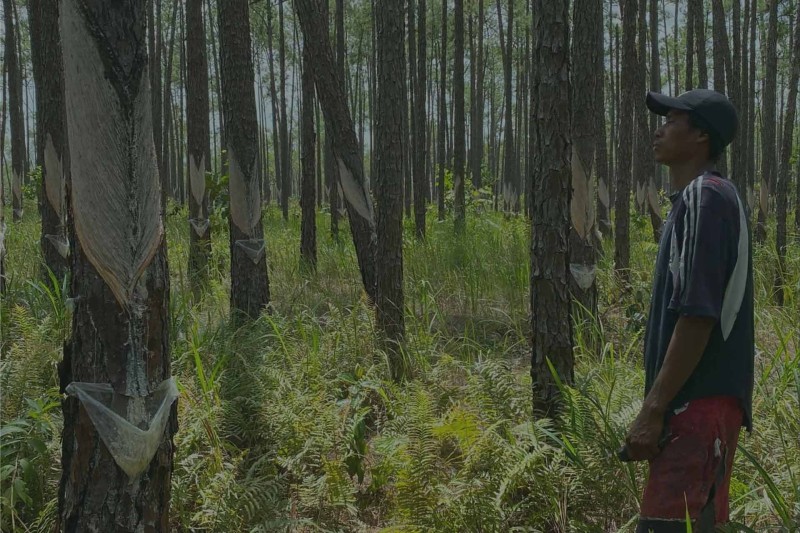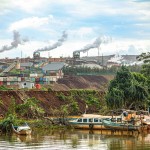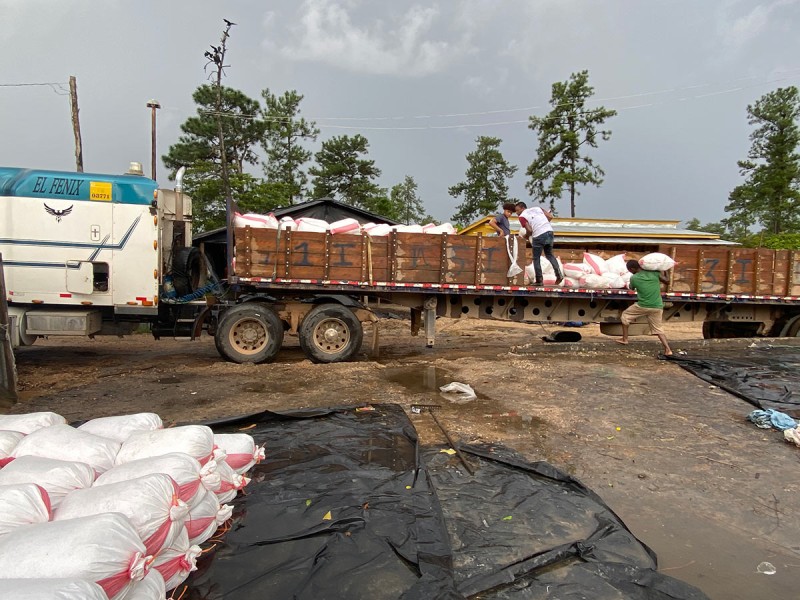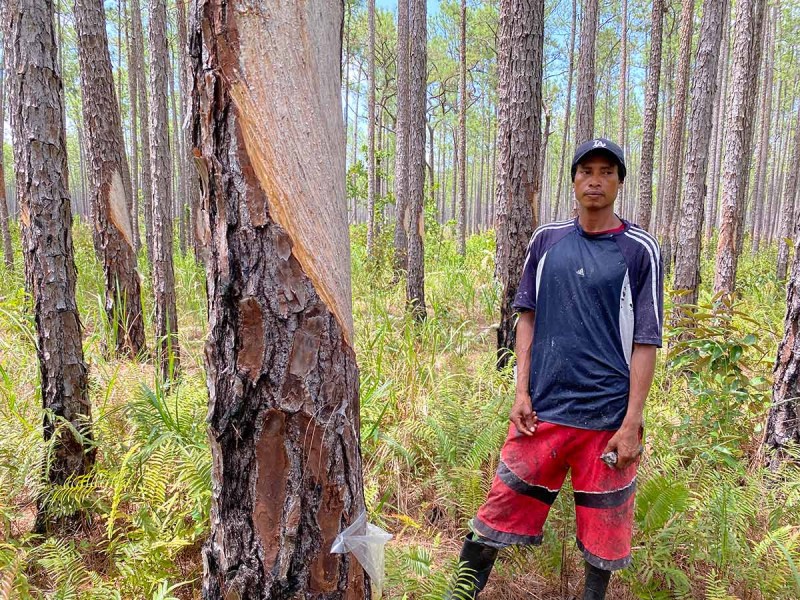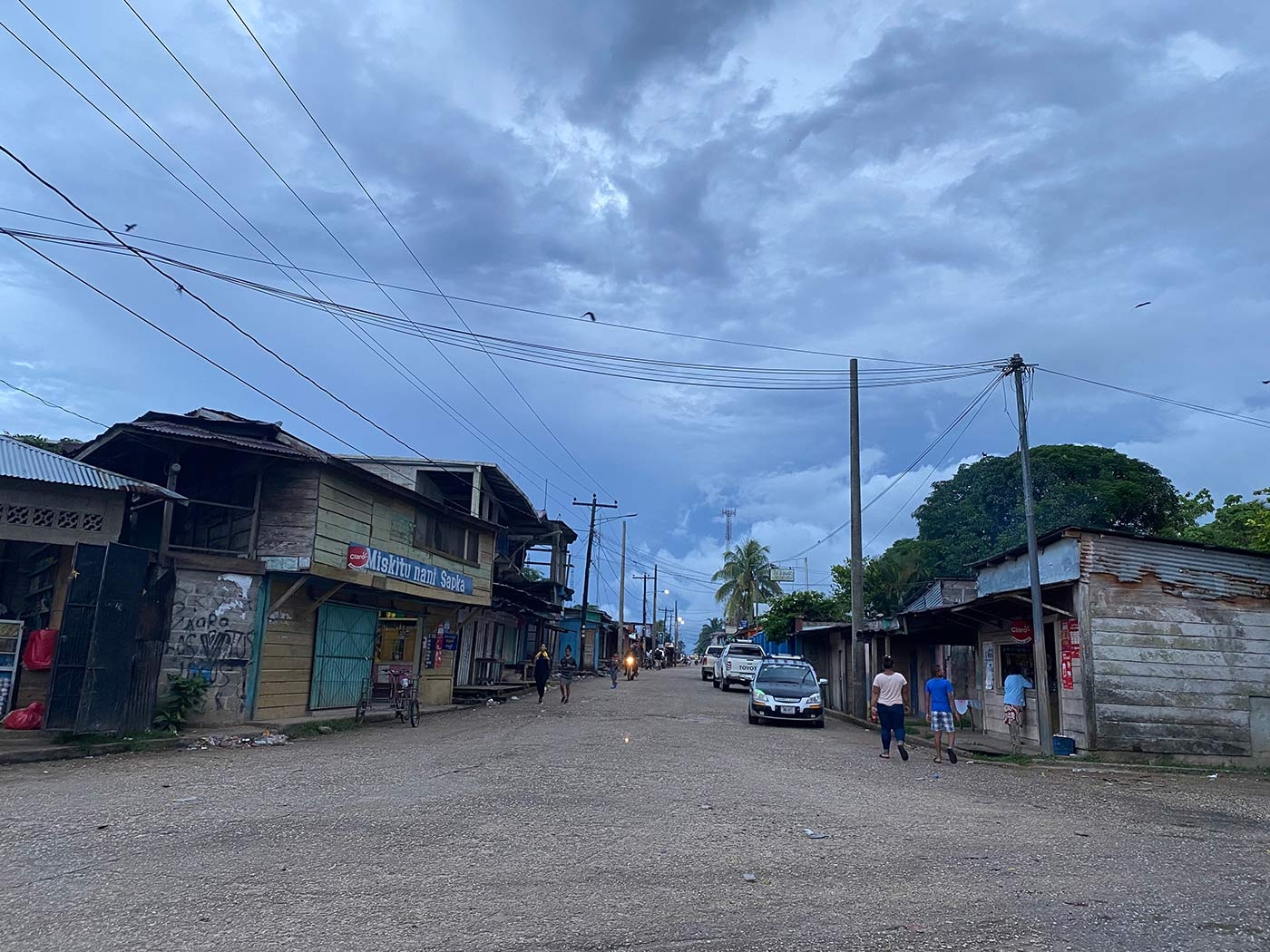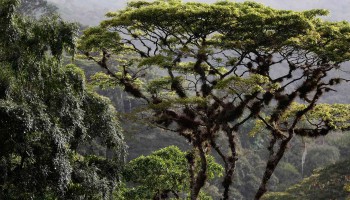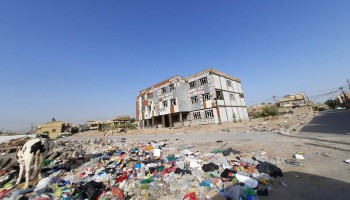As a young man, Osorno Cóleman Salomón led indigenous troops into battle against the forces of Nicaraguan President Daniel Ortega during the country’s brutal civil war.
Decades later, the former commander of CIA-backed Contra fighters has made a spectacular about-face. Now a member of Congress allied with Ortega’s Sandinista Party, Cóleman is pushing his Miskito community to work with the government, promoting a pine resin company named Vida Group International as a path to reconciliation.
“We want jobs, progress, and development, not violence, not the resentments of the past, not hatred between brothers,” Cóleman wrote in a 2017 Facebook post touting resin collecting as a source of employment for the community and praising his “alliance” with Ortega’s government.
But Cóleman’s push for unity is not what it seems.
A new investigation by OCCRP found the former guerrilla commander secretly held a 10 percent stake in Vida Group and may have illegally profited from the company’s inroads into Miskito land.
Top Sandinista officials have intervened to facilitate Vida Group’s activities, according to information in a cache of leaked data from inside Nicaragua’s forestry agency, Inafor. Emails in the leak show Vice President Rosario Murillo and National Assembly President Gustavo Porras personally interceded to authorize Vida Group’s exports during a crucial period in which the company’s shipments surged more than fivefold.
Cóleman’s turnabout illustrates how the Ortega regime has used patronage to expand its power into Nicaragua’s indigenous regions. By law these zones, which cover at least 31 percent of the country, are meant to be autonomous and the lands collectively controlled by community authorities.
But Miskito people from around Waspam in the North Caribbean Coast Autonomous Region (RACCN), where Cóleman established himself as an influential local politician before entering Congress as a national representative, told an OCCRP reporter who visited the area that Vida Group has left a trail of hardship and anger.
Locals said Cóleman had promoted the company as a source of employment for the community. But, far from helping, workers say Vida Group pays them barely enough to survive for collecting resin, which is then shipped abroad at more than double the price.
“From our perspective, as indigenous people we do value [Cóleman] as a leader,” said Felix Osenes, who collects resin to sell to Vida Group. “But for his part, he does not take us into account. To him we are nothing.”
Adrián Sierra, a council member from the autonomous regional government of the RACCN, said Vida Group has prospered as a result of its ties to the Ortega regime while riding roughshod over the community. “They have always been manipulating and using, taking advantage of crisis and the needs of communities,” he said.
Cóleman acknowledged he once held shares in Vida Group, but defended his involvement, saying he wanted to provide jobs in poverty-stricken indigenous communities and denying he ever made any profit. He said he had resigned from the company several years ago, but when pressed for details he changed his story several times, giving different dates for when he left.
"I haven't robbed one peso from the community," he said of accusations that his arrangements with Vida Group and the Sandinista Party were improper or corrupt. "I have clean hands and a clean face.
It’s not just the resin collectors that Vida Group is accused of exploiting. Workers say the trees that produce the amber liquid are now dying from overuse.
“Some pines are dying and some pines are drying up,” said Alcides Wilfred Martínez, a former resin collector from the Miskito village of Koom. They are “dying little by little.”
Foes Become Friends
Some Miskito people in the region call Cóleman “Cacique,” a term often used for indigenous chiefs.
He also goes by Comandante Blas, a nom de guerre he assumed after he became a commander during Nicaragua’s civil war. In an autobiography published in 2019, Cóleman described taking up arms after watching in dismay as the Marxist revolution that swept Ortega to power turned against his people.
“The Sandinista revolution was on a collision course with my Miskito people,” Cóleman wrote. “I abandoned the peaceful approach to struggle and joined the ranks of the new guerrillas.”
The conflict stemmed partly from the Sandinistas’ efforts to make Nicaragua’s indigenous communities assimilate, using programs such as Spanish literacy campaigns, said Mateo Jarquin, a history professor at Chapman University in California. Indigenous communities interpreted this “as the Sandinistas saying, ‘You can’t be Indian anymore,’” Jarquin said.
As military leader of the CIA-backed Miskito Contra forces, Cóleman interacted with top leaders in both the U.S. and Nicaragua. This included meeting U.S. President George H.W. Bush, engaging in high-level negotiations with the Sandinistas and signing a ceasefire agreement with Ortega’s successor, President Violeta Chamorro, in 1990.
On return to civilian life, Cóleman obtained a law degree in 1999 and turned to politics. He openly maintained his fierce opposition to Ortega and the Sandinistas, whose forces had perpetrated severe human rights abuses against the Miskito during the civil war. In 2006 he was part of a delegation that travelled to the U.S. to file charges of genocide and crimes against humanity against Ortega himself.
“The blood spilled by our indigenous people is priceless,” Cóleman told La Prensa in 2011. “That is why our communities hate Daniel Ortega.”
But behind the scenes, things were starting to change. Gustavo Nixon, a judge who was Cóleman’s second-in-command during the civil war, said the former guerilla fighter started working closely with the authorities soon after peace was declared.
“When we got to that point, we were abandoned,” Nixon told OCCRP. “He was the only one working with the government…. Now he is well positioned, living the lifestyle of a deputy.”
In 2013, pro-Sandinista national media reported that Nicaragua’s Attorney General was investigating Cóleman and several other notaries and registrars for illegally transferring indigenous land. Two years later, the Attorney General’s office filed a complaint against Cóleman and the others with the Supreme Court, accusing them of violating laws intended to protect territories that are communally owned by indigenous communities.
Cóleman said the accusations were never proven and he had not violated any laws. OCCRP tried to find out more about the alleged land grabbing from an exiled Nicaraguan human rights group, but its leader had just survived an assassination attempt and other members were too scared to speak.
The charges were announced in 2015, the same year Vida Group was founded by James Webster Pitts, a former professional baseball player and indigenous independence activist who had studied forestry. Webster also had political connections: He was a member of a party which Cóleman led and reportedly a friend of senior Sandinista Lumberto Campbell.
Dzung Nguyen, a former part-owner and treasurer of Vida Group, said Cóleman and one of the other investors came up with the idea to set up a pine resin company on a plane ride together, then brought in Webster later. He said Cóleman would handle “public relations” for the company, including ensuring it got the government permits it needed.
“Whenever there was an issue with Inafor, or with getting permits or roadblocks, James [Webster] would go to Cóleman,” said Nguyen.
Neither Webster or Campbell responded to requests for comment. Cóleman said he had advocated for Vida Group to get government permits “so that the communities could get jobs” but denied he had done anything wrong. “I am not corrupt,” he said.
By 2016, Cóleman had completed a remarkable political reversal: He joined forces with the Sandinista Party. Under the arrangement, Cóleman remained a member of a regional indigenous party, but allied with the Sandinistas to run for Congress. He told La Prensa at the time that he was not truly a Sandinista, but was seeking benefits for indigenous communities.
Documents seen by OCCRP, including notarized minutes from shareholder meetings, show that by October 2017, Cóleman had a 10 percent stake in Vida Group. Jorge Valladares, an anti-corruption expert at Transparency International, said this violated Article 130 of Nicaragua’s constitution, which makes it illegal for anyone in public office to get concessions, such as government approvals for permits, from the state.
“It’s not only prohibited, but the concession or the permit that has been granted is void,” Valladares said.
He noted that the way Vida Group is set up — where workers harvest resin as contractors then sell it to the company — means the export permits are granted to the Miskito community, not the company itself. This, he said, may be a deliberate effort to circumvent the law prohibiting Cóleman from receiving state benefits.
“The whole scheme may have been set up because of the participation of the Congressman in this company,” he said.
In November 2017, after Cóleman already had a stake in Vida Group, he wrote the message on Facebook that urged his fellow Miskito to set aside “hatred between brothers” and embrace the alliance with the Sandinistas.
“This is how our alliance functions with the government of Ortega and his wife Rosario Murillo,” he wrote.
Business Booms
Although Vida Group was founded in 2015, its business really took off four years later after it found a new buyer for its pine resin in Vietnam, which uses it in products such as gum turpentine oil, often used to thin oil-based paints, and gum rosin, which can be used to make glue.
But in mid-2019, these exports hit a snag: Vida Group had requested permission to ship more resin that was allowed under the forestry exploitation permit it had received from Nicaragua’s forestry agency, Instituto Nacional Forestal, known as Inafor.
Elizabeth Saravia, an Inafor official, informed her colleagues in an email on June 11, 2019, that Inafor’s legal team could not approve the request, questioning how it was even allowed to be submitted in the first place.
A subsequent export request from Vida Group in August was handled very differently. This one was taken up personally by Porras, the National Assembly president, and Vice President Murillo, both of whom have been sanctioned by the U.S. for undermining Nicaragua’s democracy.
“Esteemed Comrade, I request your authorization for the approval of the following Export Licenses,” Porras wrote to Murillo on August 16, listing two export requests, covering 48,000 kilograms of pine resin each, submitted by Vida Group.
Less than two hours later, Murillo emailed to give her approval.
Two spreadsheets from the leaked Inafor data show Vida Group’s pine resin exports had recently ballooned, rising from 322,000 kilograms worth $257,600 in the first half of 2018 to 1.80 million kilograms worth $1.49 million in the first half of 2019. The export volume increased in the second half of the year, after Murillo’s approval email, reaching 1.85 million kilograms, worth $1.38 million.
Vida Group was by far the top exporter of pine resin in Nicaragua in 2019, according to another spreadsheet, accounting for almost 90 percent of exports.
Nguyen said that when they had problems, company leaders would turn to Porras and another member of Ortega’s inner circle, Supreme Electoral Council director Lumberto Campbell, a childhood friend of the company’s founder.
"I attend maybe three meetings with people, including Lumberto Campbell. … In one meeting I met with a guy named Gustavo Porras,” he told OCCRP. “Doing business there you have to have connections, or otherwise nothing happens.”
Sierra, the councillor from the RACCN government, also said Vida Group got the permits it needed through its political influence. “They used all the resources and mechanisms they have to bring this company” to the region, he said.
Cóleman said he advocated for permits on the company’s behalf in order to bring jobs to the community, but was not involved in Vida Group’s finances.
Campbell and Porras did not respond to requests for comment. Murillo acknowledged receiving questions from reporters, but did not respond to them.
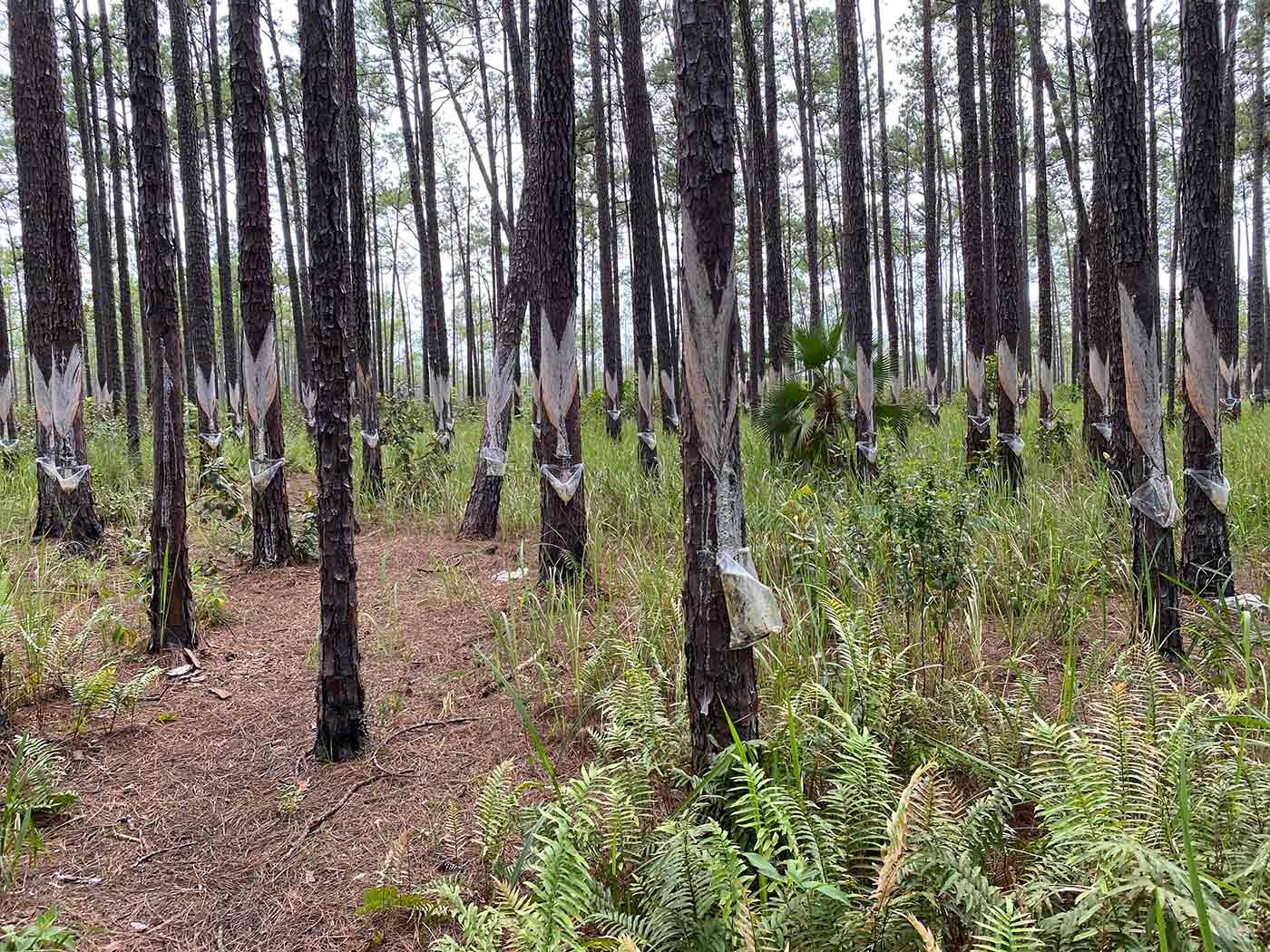
‘Serious Human Rights Violations’
But as Vida Group’s business boomed, its relationship with the Miskito community soured.
The company’s system of paying workers by volume forced residents to work long hours in poor conditions, resulting in injuries and illnesses, according to a 2019 report by the Center for Justice and Human Rights in the Atlantic Coast of Nicaragua.
“The extraction of resin from pine trees by Vida Group has resulted in serious human rights violations in the indigenous population in relation to labor rights and other fundamental rights,” the report concluded.
A worker showed an OCCRP reporter how the resin is harvested, hacking away the tree bark with a machete, then collecting the sticky liquid in plastic bags. In interviews in July, many Vida Group laborers chafed at the low prices they were receiving for the resin — about 4 córdobas (around $0.11) for a pound — while having to pay for the equipment needed to harvest it.
Data from the Inafor leak shows that in 2019, Vida Group exported resin at an average price of 11.79 córdobas per pound, more than double what workers were paid for its extraction.
“By the end, we have nothing. We’re left with 200, 300 [córdobas] to bring home,” said Wilfred, the former Vida Group worker.
Lamberto Chow, a Miskito leader in Waspam, said Blas had promoted the company, but it had done little to help the community. “The town is definitely not benefiting, rather it is damaging the natural resources of our area,” he said.
Those who have opposed the company have faced blowback.
In January 2017, police arrested a Miskito judge whose community had resisted Vida Group’s entry, according to reports in La Prensa and an investigation by the nonprofit Nicaraguan Center for Human Rights. Community members said the judge was accused by Cóleman and others of setting fire to the company’s resin stores and five hectares of trees.
But the human rights group’s investigation found no evidence that such a fire had occurred.
Cóleman said the judge was a “criminal” who was detained for offenses including not only the fire but the kidnapping of two company guards. The human rights group’s report concluded that the judge was not involved in any kidnapping.
Politics and Pine Resin
Vida Group isn’t the only politically connected pine resin company operating in the RACCN.
Inafor also granted export permits to Resinera Export, S.A., which is run by one of the most powerful families in the region and also has ties to the Sandinistas. In 2019, the company shipped 383,080 kilograms of pine resin, making it the second-largest exporter behind Vida Group.
The company’s manager, Otis Plazaola Cunningham, is the cousin of the region’s coordinator, Carlos Alemán Cunningham, and the nephew of the mayor of Waspam. Carlos has reportedly been accused of selling exploitation rights to indigenous land in the RACCN. U.S. nonprofit the Oakland Institute said the Cunningham family, longtime leaders among the Miskitos, have in recent years aligned themselves with the Ortega regime.
Plazaola Cunningham told OCCRP that having relatives with political connections does not guarantee obtaining permits. "It's been more than two years and the permits have not yet come out due to how difficult it is to meet the requirements," he said.
Juan Carlos Ocampo, a Miskito community leader in the RACCN, estimated that the leaders of 90 percent of indigenous communities in the region were either co-opted by the Ortega regime or brought in by the government against the wishes of the majority. These leaders can then sign off on mining and forestry projects without consulting local communities. By law, the rights to this indigenous land and its exploitation are communal.
“It is a policy of the state” which “promotes extractive projects,” Ocampo said.
But the pine resin boom may not last forever. Several Vida Group workers and others within the Miskito community told OCCRP the pine trees that produce the resin are dying from over-exploitation.
“Everything is going to die. That is what we are seeing right now,” said Alfredo Toledo, an elder from Bilwas Karma, where Vida Group operates.
Chow, the Miskito leader in Waspam, said community chiefs planned to lodge a complaint with the company over the damage to the trees. “There was a commitment when this work began that it was going to be reforestation and even that reforestation was forgotten,” he said.
Cóleman, meanwhile, continues his political career on the coattails of the Sandinistas, running for reelection in November on the Congressional list of Sandinista Party allies. Ocampo said that Cóleman’s embrace of the Sandinistas all but guarantees his re-election.
“Osorno [Cóleman] is an example of the corruption of the system,” Ocampo said.
